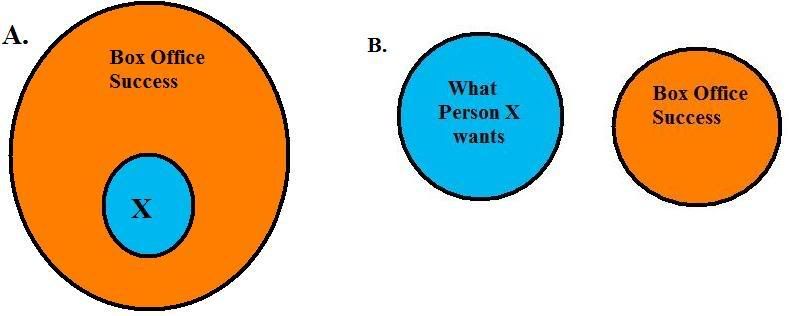Cary L. Brown said:
Insofar as we mean 'quality' as 'something somebody determines to be quality', this is correct. A film is a success at the box office because enough people consider it quality.
But this is not the kind of quality
Star Treks is talking about. It is not the kind of quality I am talking about. The distinction between quality and success is, first, what
you consider quality and, second, what is a success at the box office. Not a long term success, an
immediate one - as I said, that's the kind that would ensure a sequel.
Blade Runner is an excellent example of what
Star Treks is proposing, because it is a film you personally consider to be quality, and which was a failure at the box office.
Therefore,
Star Treks' question is fairly reasonable.
Okay, let me try a different approach. Do you remember your "sets" math problems from back when you were a kid?
Those are Venn diagrams, aren't they? I don't remember ever calling them 'sets', but then I was never any good at maths. Assuming they are Venn diagrams, permit me to provide some of my own:
These are the two principles I will be considering. Why do I call the orange one 'Box Office Success'? Well, this represents exactly what it stands for. I don't claim that box office success also equals 'the general public', just enough people go to the film for it to make money. Please note instead of the fans I have 'Person X'. Who is Person X? Person X is you, Person X is me. Person X is any hypothetical person who wants the next
Star Trek film to be what he considers to be a good movie. The reason why I did not chose the term fans should be obvious for two reasons. First, the fans are an amorphous entity. Anyone who has been on this board knows that there are intense disagreements about virtually every aspect of
Star Trek, what
Star Trek consitutes as quality and what does not. You can't fit us all into one Venn circle.
To put this another way:
Both you and I agree on
Blade Runner, but not on
Transformers. I would include here a film I like and you don't, but I don't know any. What is not at issue here is the fans, but individuals. We all have our own opinions on what constitutes a quality film. My favourite Hitchcock film, for example, is
Topaz. So far as I know, I am the
only person who believes this - the film was considered a step down for the director not just by audiences, but by critics, and even the extras on the DVD I posess involve a bit of
Topaz bashing for those concerned.
Now, let us assume that Abrams film is a box office success. There are two possible responses by Person X to this fact:
In
A., Person X considers the film to be of quality, in
B., he does not. Both are hypothetical possibilities for anyone on this board. There are no doubt different chances of likelihood - for example, the chance you will reach position
B. may be as low as some purists from reaching position
A.. But as hypotheses go, it's not 'bogus', it is both possible and maybe even probable. Nobody, including myself, is saying this
will happen. Nor are we speculating on its likelihood. But either possibility
might, and it's an interesting contrast to ponder.
Now, your central premise is that what the fans what is by and large what the general public wants, and that being the case, a box office success will be greeted with the position outlined in your Venn diagram and something similar to my position
A.. It is no doubt possible that many individual persons will reach position
A., but the position of the fanbase will be more like this:
The size of the circle is not intended to have any significance here. Perhaps the majority of the fanbase will be in the purple (liking it) with just a sliver of blue (unliking it), but this will be the response. And so, while individual opinion and the box office differ, the fans and the box office
also do not entirely overlap - and thus are distinct entities.
I submit to you two examples:
Star Trek: The Voyage Home, and
Star Trek: First Contact. Both of these films were box office successes, both of these films have their fans in the fanbase. But they also have their critics. Offhand, both I and
trevanian have criticised
Star Trek: The Voyage Home,
Star Trek: First Contact's critics include
The God Thing and YouTube critic
confusedmatthew (two fans I doubt I would normally mention in the same sentence).
Finally, a side issue: I have limited the definition of success to success at the box office. But even if we include long term success with revivals, DVDs, and cult audiences, I am sure you will find films you do not like - successes that do not equal your standards of quality. I've certainly come across the odd cult film I'm not too fond of. Last week I had a look at
Eureka's recent release of
Fantastic Planet, and as intriguing as it appeared, I have to admit it was too weird for my standards. Group quality, as I've said in many ways, doesn't apply to this question - it gives you a possible premise of having your definition of quality be in the minority, even if only for the short term.
In conclusion: However you wish to define A (and have done so) or B (and have done so),
Star Treks has constructed a reasonable hypothesis.







